Terrifying Tuesday begins as 40 mile long Russian convoy nears Kyiv, ICC opens war crime probe, Shell pulls $3bn and Ukraine wants to join EU
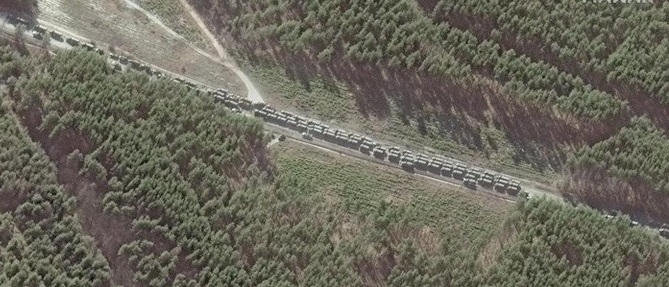
A Russian military convoy threatening Kyiv is far bigger than initially thought, with satellite images showing it occupying much of a 40 mile stretch of road north of the Ukrainian capital.
It comes as more than 70 Ukrainian soldiers were killed after Russian artillery hit a military base in Okhtyrka, a city between Kharkiv and Kyiv, according to a post by the head of the region Dmytro Zhyvytsky on Telegram.
And explosions and gunfire were heard in embattled cities in eastern Ukraine as Russia’s invasion met unexpectedly stiff resistance.
Also this morning, Prime Minister Boris Johnson has left London for Warsaw where he is due to meet with Polish Prime Minister Mateusz Morawiecki.
Johnson is set to discuss the UK’s financial and diplomatic support for central Europe as it faces the prospect of a humanitarian crisis. Following the meeting he is set to fly to Estonia, where he will meet with leaders in Tallinn before visiting serving troops alongside NATO secretary-general Jens Stoltenberg.
Meanwhile, an International Criminal Court prosecutor is to open a probe into possible war crimes or crimes against humanity in Ukraine. while Ukraine said early this morning that the first round of talks with Russia about ending the fighting has concluded and that more talks could happen soon.
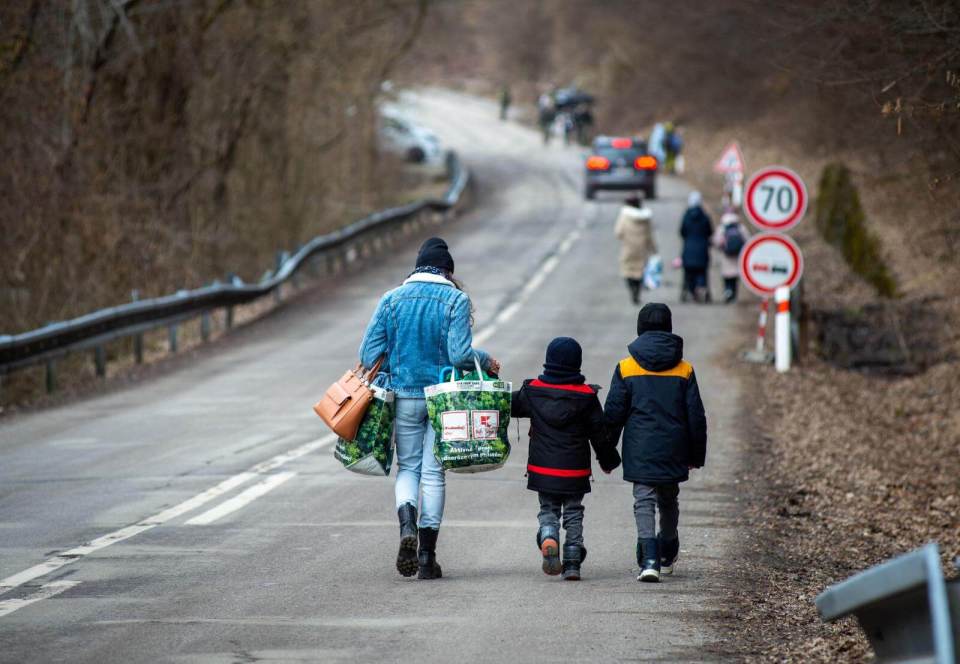
Moreover, oil giant Shell has announced it will end all joint ventures with Russian gas firm Gazprom, worth around $3bn, while Japanese billionaire Hiroshi Mikitani has donated 1 billion yen to Ukraine, promising the sum in a letter to Ukraine’s president Volodymyr Zelensky.
Meanwhile, late last night, that same president said he has applied for Ukraine to join the 27-nation European Union on the fifth day of the Russian invasion of his country.
Meanwhile, Neutral Switzerland said this afternoon it will adopt European Union sanctions against Russians involved in Moscow’s invasion of Ukraine and freeze their assets.
The move marks a sharp deviation from the Alpine country’s traditional neutral status.
The Swiss move comes as it was reported that more than 4,500 Russian soldiers have now been killed in Ukraine, according to various reports, including Reuters, while the UN’s refugee agency has said that more than 500,000 people have fled the country.
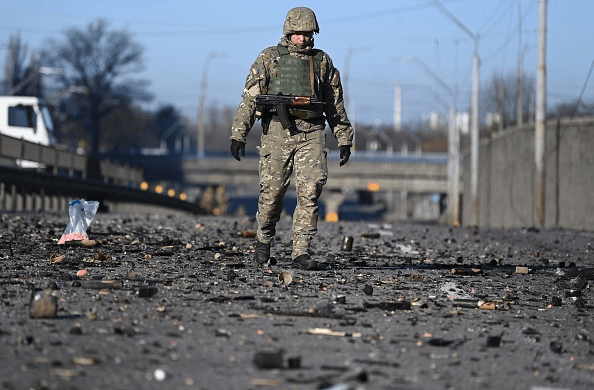
Thousands of Russian soldiers killed
Media in Eastern Europe report the number of Russian soldiers killed has climbed to around 4,500, including Reuters. Russia has not responded to any of these reports.
Over in Moscow, thousands of Russians have descended on cash machines iand across the country, while the Russian Rouble is down by nearly 30 per cent cent against the US dollar this morning after Western nations moved to block Russian banks from the SWIFT global payment system.
In response, Russia’s Central Bank raised its key rate from 9.5 per cent to 20 per cent this morning, in a desperate attempt to shore up the plummeting Rouble and prevent the run of banks.
The bank’s action follows the Western decision on Sunday to freeze its hard currency reserves in an unprecedented move that could have devastating consequences for Russia’s financial stability.
Restrictions on the Russian central bank target its access to more than $600bn dollars (£450bn) in reserves the Kremlin has at its disposal. They hinder Russia’s ability to support the rouble as it plunges in value.
Sanctions announced earlier had taken the Russian currency to its lowest level against the dollar in history.
The Russian offensive in Ukraine is likely to become “more violent”, UK Defence Secretary Ben Wallace has warned.
“The Russian handbook is to get more violent and commit more forces because the lives of their own soldiers matter much less than in other armed forces.”
UK Defence Secretary Ben Wallace
Wallace told BBC Breakfast this morning that although the Ukrainians were putting up “a very strong fight” the reality was they were going up against “the overwhelming scale of the Russian Federation Army”.
Over the weekend, Japan joined the moves by the US and other western nations to impose more sanctions against Russia.
Russia’s economy is set to descend into turmoil after an alliance of Western nations over the weekend launched a sweeping set of sanctions to hobble the country’s financial system.
The measures prompted Russia’s central bank yesterday to plead with the country’s citizens to exercise calm amid growing concerns among Russian citizens that their money could soon disappear.
Nuclear site hit
In other developments, the United Nations’ nuclear watchdog said this morning missiles have hit a radioactive waste disposal site in the Ukrainian capital of Kyiv.
In a statement, International Atomic Energy Agency director general Rafael Grossi said Ukrainian authorities informed his office about the overnight strike, but there are no reports of damage to the buildings or indications of a release of radioactive material.
He said his agency expects to soon receive the results of on-site radioactive monitoring.
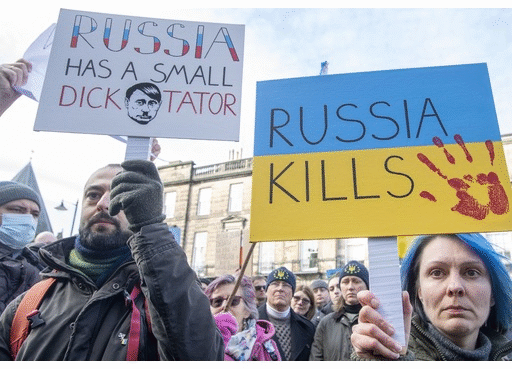
The report came a day after an electrical transformer at a similar disposal facility in the Ukrainian city of Kharkiv was damaged.
Such facilities typically hold low-level radioactive materials such as waste from hospitals and industry, but Mr Grossi said the two incidents highlight a “very real risk”.
He said if the sites are damaged there could be “potentially severe consequences for human health and the environment”.
Troops draw closer
It comes as Russian troops drew closer to the Ukrainian capital whose mayor warned the city was encircled, and President Vladimir Putin ordered Russian nuclear forces to be put on high alert
In an interview with the Associated Press (AP) on Sunday, after a gruelling night of Russian attacks on the outskirts of the city, mayor Vitali Klitschko was silent for several seconds when asked if there were plans to evacuate civilians if Russian troops managed to take Kyiv.
“We can’t do that, because all ways are blocked,” he finally said. “Right now we are encircled.”
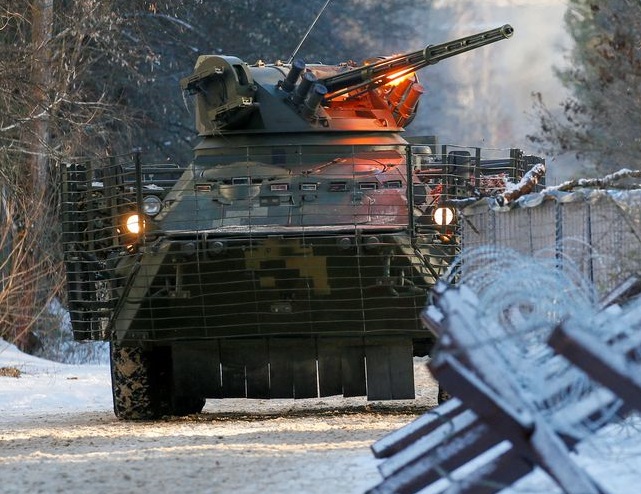
A senior US intelligence official has also said Belarus is expected to send troops into Ukraine as soon as Monday to fight alongside Russian forces that invaded last week.
Belarus has been providing support for Russia’s war effort, but so far has not taken a direct part in the conflict.
Meanwhile, in the port city of Mariupol, Ukrainians are trying to fend off a Russian advance.
An ambulance raced into a city hospital on Sunday, carrying a six-year-old girl who was mortally injured in Russian shelling.
She was pale. Her brown hair was pulled back with a rubber band. Her bloody pyjama pants were decorated with cartoon unicorns. She was brought in with her wounded father, his head bloodied and bandaged.
A medical team pumped her chest, fighting desperately to revive her. Her mother stood outside the ambulance, weeping.
“Take her out! Take her out! We can make it!” a hospital worker shouted, pushing a gurney to the ambulance.
The girl was raced inside and doctors and nurses huddled around her. One gave her an injection. Another tried to revive her with a defibrillator. A nurse wept.
A doctor in blue medical scrubs, pumping oxygen into her, looked straight at the camera of an Associated Press video journalist who had been allowed inside.
“Show this to Putin,” he said angrily. “The eyes of this child, and crying doctors.”
The girl, whose name was not immediately known, could not be saved. The doctor reached gently over her face to close her eyes.
Her body was left alone in the room, covered by her brightly coloured polyester jacket, now spattered with blood.
Street fighting also broke out in Ukraine’s second-largest city, Kharkiv, and strategic ports in the country’s south came under pressure from the invading forces.
How can Britons help Ukrainians during the conflict?
Britons have been asking City A.M. how to help Ukrainians following Russia’s full-scale invasion of the nation.
The attack, launched on February 24, has seen around 368,000 Ukrainians flee the nation to safety.
Defence Secretary Ben Wallace has urged Britons not to travel to Ukraine to join the fighting, and help in other ways, such as donating money through the Ukrainian embassy to be spent on weaponry and aid, or to volunteer with organisations helping refugees.
Here are the ways you can help from home.
Donate to relevant charities
If you’re able to afford it, donating money to various charities will go a long way to supporting those on the ground.
Unicef executive director Catherine M Russell said in a statement: “Unicef is working across eastern Ukraine to scale up life-saving programmes for children. This includes trucking safe water to conflict-affected areas; prepositioning health, hygiene and emergency education supplies as close as possible to communities near the line of contact; and working with municipalities to ensure there is immediate help for children and families in need. Unicef-supported mobile teams are also providing psychosocial care to children traumatised by the chronic insecurity.”
Donate here: https://www.unicef.org/ukraine/en/take-action
High Commissioner for Refugees Filippo Grandi said the UN Refugee Agency is “working with the authorities, UN and other partners in Ukraine and is ready to provide humanitarian assistance wherever necessary and possible”. Donate here: donate.unrefugees.org.uk
Sunflower Of Peace is a local charity gathering medical supplies for paramedics and doctors on the front lines. Donate here: facebook.com/donate/507886070680475
The British Red Cross has launched an urgent appeal to help Ukraine – you can send your money here: donate.redcross.org.uk/appeal/ukraine-crisis-appeal
Finally, head to United Help Ukraine (unitedhelpukraine.org) to support a charity focused on providing humanitarian aid to those in need, as well as raising awareness of the conflict.
Write to your MP
Writing a letter to your local MP can help urge the Government to do more to help the nation during the conflict.
To find your MP, visit the UK Parliament website on www.members.parliament.uk/members/Commons and type in your postcode or address.
Prime Minister Boris Johnson has announced that immediate family members will be able to join Ukrainians settled in the UK following a relaxation of visa requirements, while Mr Wallace has hinted further measures could be announced soon.
Support local journalism
The fact we’re so up to date with what’s happening in Ukraine is largely down to the tireless work of journalists reporting on the ground.
To help them continue this crucial work, follow the news from local sources such as The Kyiv Independent (kyivindependent.com – you can also donate on its website) and The New Voice of Ukraine (english.nv.ua).
Educating yourself on the history and nuances of the crisis from respected sources before speaking about it online will help tackle disinformation.
Join a peace protest
This might not seem as direct a way to help Ukrainians as, for example, donating money – but it could still have a big impact.
Joining a peace protest (if you are able to do so and feel comfortable being in a crowd) is a public way of showing your support for the people of Ukraine, and putting pressure on those in powerful positions to help those affected.
Donate items locally
Donation points are being set up locally across the UK to help collect items for new arrivals moving from Ukraine to other nations.
According to reports, Leeds Polish Catholic Centre in West Yorkshire collected items such as blankets, clothes, toilet rolls, nappies and toothbrushes over the weekend while the White Eagle Club in south west London also received goods for refugees.
Volunteers are also needed to help sort through the items and pack them up to send them overseas.
Check your local news outlets and social media to see if donation points have been set up in your area.
They are often being established by Ukrainian and Polish community groups and churches in different towns and cities.
For all the latest Lifestyle News Click Here
For the latest news and updates, follow us on Google News.

